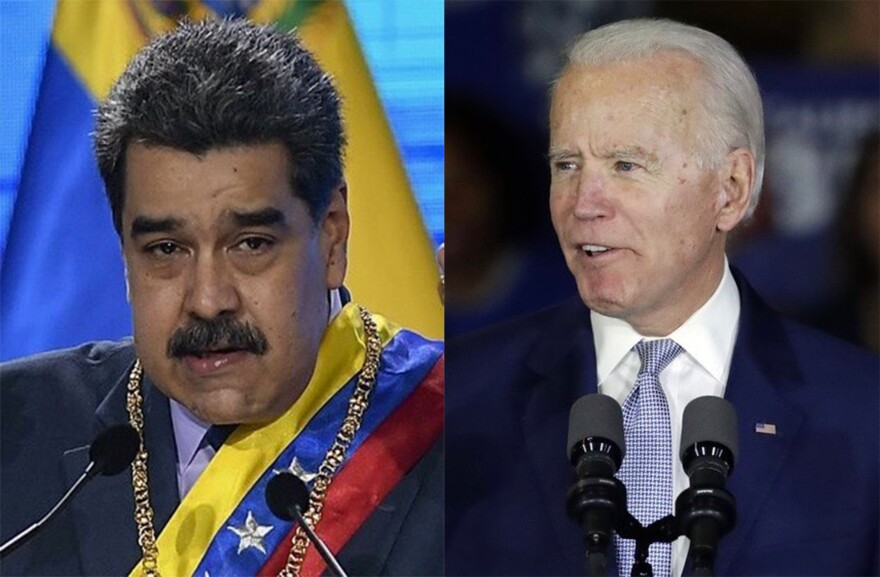Before leaving office last month, President Trump suspended deportations for Venezuelan exiles living in the U.S. That protection matters because Venezuela's humanitarian disaster, one of the worst in South American history, isn't likely to end anytime soon.
The question now is, what can President Biden do to end that crisis? Can he succeed where Trump failed in helping to oust Venezuela's authoritarian socialist regime and restore democracy there?
In these uncertain times, you can rely on WLRN to keep you current on local news and information. Your support is what keeps WLRN strong. Please become a member today. Donate Now. Thank you.
WLRN's Luis Hernandez spoke with Americas editor Tim Padgett about Biden's possible strategy in Venezuela — and where all this leaves South Florida's large Venezuelan diaspora.
Here are some excerpts from their conversation:
HERNANDEZ: Tim, how would you describe the situation in Venezuela now?
PADGETT: Venezuela is being described by Latin America experts now as a failed state. It just keeps becoming a worse political and economic and security disaster.
READ MORE: Trump's Deportation Suspension Both Gratifies and Galls South Florida Venezuelans
The U.N. reports one in three Venezuelans doesn't know where their next meal is coming from. The U.N. is also accusing the regime of crimes against humanity. And on top of that, Venezuela has South America's highest murder rate.
So, about two to three million more Venezuelans are expected to flee the country this year. That would bring the total since 2015 to about seven million. That's almost a quarter of the population leaving Venezuela in just six years.

Did Trump at least succeed in weakening the regime of President Nicolás Maduro?
Not really. Trump did make life difficult for Maduro and the socialists. The targeted U.S. economic sanctions have hurt them; so has the de facto embargo on Venezuelan oil. But Maduro looks more entrenched in power now than he did when Trump took office.
Why is that?
One big reason is the help Maduro gets from Cuban security forces. But another is Trump's big missteps.
You'll remember Trump recognized opposition leader Juan Guaidó as Venezuela's legitimate president, right? And he got a lot of the international community to join him. But Trump ended up wasting all that diplomatic leverage he had going for him. He kept using rhetoric like, "All options are on the table," which made people think he was contemplating a military invasion of Venezuela.
And he dismissed the international talks that were underway between the opposition and the regime, brokered by Norway, to get Maduro to make democratic concessions like holding new presidential elections. Trump and his team thought those were useless or unnecessary. They essentially believed Maduro would just surrender to him.
Biden can't go it alone on Venezuela the way Trump tried to do it in the end. He'll need more international partnership to help pressure Maduro.
So what are the best options left to Biden now?
It looks like his best option is, on the one hand, keep Trump's economic sanctions in place; but on the other hand, revive those diplomatic talks I just mentioned to more effectively leverage those sanctions.
For example, some Latin America experts are recommending Biden regroup the Latin American and European countries that stand with the U.S. against Maduro and get Maduro to make democratic concessions in return for relief from those sanctions. Relief such as: letting Venezuela sell its oil to us again; but instead of getting paid in cash, Venezuela gets paid in food distributed directly to Venezuelans, with international monitoring.
But the point is, Biden can't go it alone the way Trump tried to. He'll need more international partnership to pressure Maduro.
COMPLICATED MESS
Will Biden still recognize Guaidó as Venezuela's legitimate president?
Yes, he is. The problem, though, is that the European Union countries no longer recognize Guaidó as Venezuela's interim president, because in December Maduro got a new National Assembly elected — fraudulently — which Guaidó does not lead. It's ... it's a complicated mess.
And what does that mean? I mean, what are the real-life implications of calling Guaidó Venezuela's real president when the person leading the government is really Maduro?
It matters because it drives home the point to the world that Maduro is not really Venezuela's constitutionally legitimate president. Most legal experts agree he was re-elected three years ago by unconstitutional means, and that gives legitimacy to the effort to remove him from power.

Now, this is all assuming Venezuela is even that high on Biden's agenda. Is it?
Frankly, no. He's got a pandemic and an economy to fix. He's got China and Russia to deal with.
And let's be honest, he's not thinking about an election right now and winning Latino votes in Florida, the way Trump was. Trump did a number of things right regarding Venezuela and he rightly made Venezuelan exiles here feel important. But in the end it was clear this was high on his agenda for domestic political reasons as much as, if not more than, for foreign policy reasons.
So will Venezuelan exiles now have to get used to the fact that they're not as politically important as they recently were?
Yes, they will. And to accept the reality that freeing Venezuela will take much more time and diplomatic work than Trump told them it would. This belief that Maduro would be gone in short order was a fantasy.




